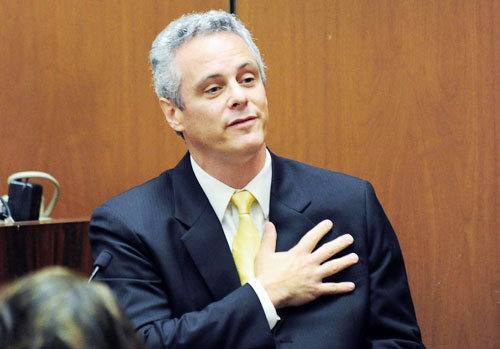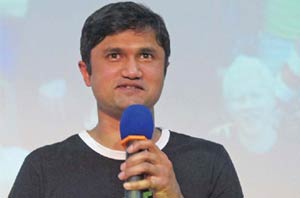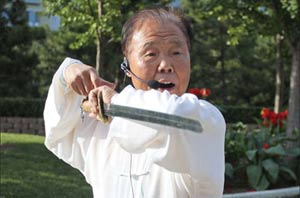Defense drops propofol claim in Jackson trial
Updated: 2011-10-13 10:59
(Agencies)
|
|||||||||
 |
|
Prosecution witness Dr. Alon Steinberg testifies in Dr. Conrad Murray's trial in the death of pop star Michael Jackson in Los Angeles October 12, 2011.[Photo/Agencies] |
Dr Conrad Murray's defense in the death of Michael Jackson suffered major blows on Wednesday when his attorneys dropped a claim that the singer swallowed a fatal dose of an anesthetic, and two doctors slammed his treatment standards.
As the prosecution neared the end of its case in the third week of the involuntary manslaughter trial, the two doctors testified that even if Jackson gave himself propofol, Murray would still be responsible for his death.
"It's like leaving a baby that's sleeping on your kitchen countertop," Dr. Alon Steinberg told jurors. "You look at it and it's probably going to be OK and you're just going to go grab some diapers or go to the bathroom but you would never do it."
Murray, who denies involuntary manslaughter, has admitted giving Jackson a relatively small dose of 25 milligrams of propofol -- which is normally used in surgery -- as a sleep aid on June 25, 2009.
But the defense has claimed in previous court hearings that Jackson, 50, somehow caused his own death either by swallowing or self-administering an extra, fatal dose when Murray was out of the room.
With the jury temporarily out of the courtroom on Wednesday, Murray's attorneys and prosecutors described medical studies to the judge that show propofol has no major effects on a person when swallowed.
"We are not going to assert at any point in time in this trial that Michael Jackson orally ingested propofol," Murray's attorney J. Michael Flanagan told the judge.
Murray's lawyers have however pressed their argument that Jackson gave himself the propofol with an injection. They are expected to begin laying out the defense case in full, possibly next week.
Murray faces up to four years in prison if convicted.
JACKSON COULD HAVE LIVED
Steinberg, who reviewed Murray's treatment of Jackson for the California medical board, said Murray made six "extreme deviations" from the generally accepted standard of care.
Those were: Administering propofol for sleep when it is meant for anesthesia; giving it at a home instead of a medical facility; not being prepared for an emergency; not taking the proper measures to revive Jackson; delaying calling for an ambulance; and not keeping proper records.
"If these deviations hadn't happened, Mr. Jackson would have been alive," Steinberg said. "I've never heard of anyone using propofol for sleep except Dr. Murray," he added later under a lengthy cross-examination.
When Steinberg described Murray's bungled attempts to revive Jackson -- including performing chest compressions even though the singer's heart was apparently still beating -- the pop star's brother Randy Jackson held his head in his hands.
Dr. Nader Kamangar, a hospital specialist in pulmonary critical care and sleep medicine, reached a similar conclusion as Steinberg.
He testified that Murray's mistakes included leaving Jackson alone after sedating him with drugs.
"Fundamental basics of the Hippocratic oath, or the ethics and morals that physicians swear by, is to do what's right for your patient, not to abandon your patient," Kamangar said.
Steinberg, like Murray, is a cardiologist. He said he based his withering critique of Murray on the physician's own account to detectives. Steinberg said a transcript of that interview convinced him Murray put Jackson on an intravenous drip of propofol after injecting him with the drug.
Murray's attorney challenged that finding, but Steinberg was unmoved. "Can we agree to disagree?" Steinberg responded.









